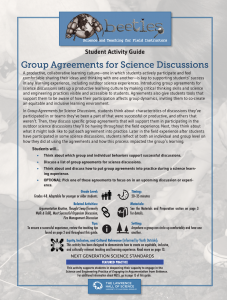A productive, collaborative learning culture—one in which students actively participate and feel comfortable sharing their ideas and thinking with one another—is key to supporting students’ success in any learning experience, including outdoor science experiences. Introducing group agreements for science discussions sets up a productive learning culture by making critical thinking skills and science and engineering practices visible and accessible to students. Agreements also give students tools that support them to be aware of how their participation affects group dynamics, inviting them to co create an equitable and inclusive learning environment.
In Group Agreements for Science Discussions, students think about characteristics of discussions they’ve participated in or teams they’ve been a part of that were successful or productive, and others that weren’t. Then, they discuss specific group agreements that will support them in participating in the outdoor science discussions they’ll be having throughout the field experience. Next, they think about what it might look like to put each agreement into practice. Later in the field experience after students have participated in some science discussions, students reflect at both an individual and group level on how they did at using the agreements and how this process impacted the group’s learning.
Students will:
- Think about which group and individual behaviors support successful discussions.
- Discuss a list of group agreements for science discussions.
- Think about and discuss how to put group agreements into practice during a science learning experience.
- OPTIONAL: Pick one of these agreements to focus on in an upcoming discussion or experience
Special Acknowledgements
We want to acknowledge Justice Outside for reviewing this session and supporting us to develop more equitable, inclusive, and culturally relevant instructional materials. Read more about our collaboration with Justice Outside.

